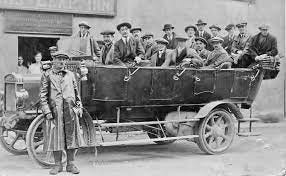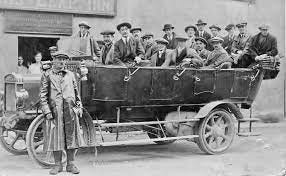It's a small world after all
Cheap travel has shrunk the planet and expanded our horizons, that could all change.
On the 1st of April 1957 the BBC ran a spoof documentary about the Ticino spaghetti harvest – where the pasta was hand-picked from trees. A prank that worked because pasta was relatively exotic in post-war Britain. Holidays were literally at home, or to “the coast” for the lucky ones. Foreign travel was still very rare, and cheeky weekend getaways on cut-price flights unimagined.
In the 1990s a friend decided to return from work on his motorbike. Nothing unusual in that, except that his work that was ending was an expat posting in Gabon and his home was in Pau in the south-west of France. Having traveled extensively and feeling that the world felt unnaturally small, his idea was to experience just how big the world is, by taking the overland route.
The democratization of travel didn’t come as a Big Bang, but a gradual normalization – first through widespread car ownership and then by a huge expansion of air travel. Indeed, the fact that air travel increased more than the evolution of efficiencies in engine technology is often cited as an example of Jevons Paradox – whereby gains in efficiency are more than offset by increased usage.
Pre-covid, the ability to monetize travel via instagram and other social media led to professional tourism. Yes, Australia still seems far, but it is only 24 hours not ten weeks away. The world has by this measure gotten a whole lot smaller. One can hop on a plane and spend quality time in an eco-resort in a different hemisphere.
Ironically, before we had access to cheap travel, the world was both bigger and smaller. The world, itself was much bigger because travel was time-consuming, expensive and usually arduous. The world that was experienced by individuals was, however, much smaller. The village you were born in, and maybe occasional trips to local towns.
I often refer to Cider with Rosie by Laurie Lee – beautifully lyrical prose about a childhood in rural Gloucestershire (on the Welsh borders) centred around the year 1919. This doesn’t fall into the simple stereotype of “we were poor but happy” nostalgia-lit, but gives a warts-and-all viewpoint. What is striking is that life in a British village 100 years ago, is almost unrecognizable today. The anecdote that struck me was of the day when the village hired a charrabanc (a predecessor to a bus) and organised a day-trip to the coast – the first and only time in the author’s childhood of venturing beyond the few miles surrounding the village. His world was really small.
With covid-related travel restrictions we have had a brief reminder of what limited travel looks like. As the energy crisis spirals, flying will become (is becoming) much more expensive. Likewise, the cost of driving will increase – and as a consequence the amount of travel will decrease. Some individuals are making deliberate lifestyle choices to preempt this – for the sake of the planet, not necessarily because of cost – but the great democratization of travel is being reversed and it will eventually become the preserve of the wealthy, just like it was 100+ years ago. This maybe a good thing for the planet. Even that eco-resort I mentioned earlier is a double-edged sword. To be a real eco-tourist you should go to Benidorm or Marbella - the damage has already been done, your incremental impact is null. Conversely, the lure of the eco-resort is “come to an unspoilt place” - but forgets the segue “and spoil it”.
Not just travel but many goods and especially foods: avocados flown in from Peru, meat from New Zealand, flowers from Kenya – will all become more expensive and less reasonable (if they ever were?). It is unlikely that we will forget what pasta is, but the world will shrink in terms of choice as well as distance for many people as energy costs increase.
The consequences of this are not well recognized – but it won’t be neutral. Take New Zealand for example. A leader in green economics, being an early leader on banning oil and gas exploration in its waters. Yet at the same time, tourism and food exports make up a significant part of the economy (Tourism accounting for 20% of total exports and direct and indirectly 9% of GDP), Agriculture some 75% of exports) . To be consistent they should export less and ban tourists. Eventually, it may simply be too expensive to travel to (or export from) New Zealand. The end of globalization will surprise many, and it won’t be a funny April Fool.
Don’t be a fool - join my substack here





